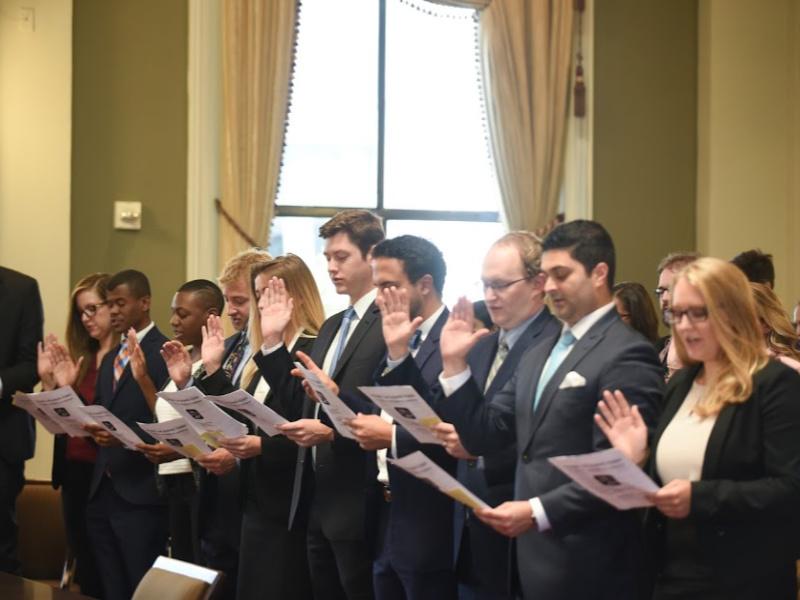New clinics on immigration and 1st Amendment rights to launch with $1.4M gifts
With generous gifts totaling more than $1.4 million, Tulane Law School is adding two new legal clinics, handling immigrants’ rights and First Amendment issues.
The two join six other in house legal clinics at Tulane: Criminal Justice, Juvenile Law, Civil Rights and Federal Practice, Environmental Law, Domestic Violence and Legislative Advocacy clinics. Tulane also provides Intellectual Property Labs in patent and trademark.
In 2020, the two new clinics will each hire an expert faculty director, helping to enhance Tulane’s unique position in addressing gaps in access to justice for indigent populations and create a pipeline of highly-trained new lawyers in these burgeoning fields of law.
“Clinics help students pursue their passions and build confidence as advocates,” said Associate Dean for Experiential Learning Stacy Seicshnaydre. “Representing people at the margins of society requires students to navigate complex or broken systems and find creative solutions, all critical to becoming effective lawyers and leaders.”
The new Immigrants’ Rights Law Clinic will prepare students to meet the rapidly growing crisis in access to justice for detainees. Supported by a generous seed gift of $400,000 by the Silicon Valley Community Foundation, it comes as Louisiana is playing an increasingly central role in the nation’s immigration crisis, as it detains more immigrants than any other state, save Texas, and as Tulane Law is expanding skills-training opportunities for students.
“In many ways, Louisiana is ground zero for the access to justice crisis for immigrants across the country,” said law Dean David Meyer. “Our new clinic will not only serve urgent community need, but it will be a training ground for the next generation of immigration attorneys.”
The launch of the clinic follows the recruitment to Tulane two years ago of Professor Laila Hlass, a leading expert on immigrant law and policy, and a substantial build-out of research and curricular offerings relating to immigration law.
“Louisiana is an incarceration destination for immigrants—with a collection of detention centers holding thousands of people as their immigration cases are heard by courts in Oakdale and Jena,” Hlass said.
In addition to representing clients and training future lawyers, the clinic will work for reform in immigration law regionally through direct services, strategic impact litigation and legislative advocacy. The clinic will also serve as a regional hub for expertise in immigration law, partnering with other organizations and networks in Louisiana and across the Deep South to broaden its impact and advocacy.
Finally, with support from a nearly $1 million gift from the Stanton Foundation, Tulane is launching a clinic that enables students to represent clients seeking to vindicate First Amendment rights of speech, the press, to petition and assembly under the supervision of faculty mentors. The gift covers the full operating costs of the new clinic for five years and enables the law school to hire a new faculty member to lead the clinic.
This second new clinic will extend Tulane’s significant strength in the area of First Amendment law and the new clinic director will be supported by an advisory panel of senior Tulane faculty experts. They include Amy Gajda, the Class of 1937 Professor of Law; Stephen Griffin, the W.R. Irby Chair and Rutledge Clement Professor of Constitutional Law; Catherine Hancock, the Geoffrey C. Bible & Murray H. Bring Professor of Constitutional Law; Lucia Blacksher Ranier, Director of Tulane’s Civil Rights and Federal Practice Clinic; and Keith Werhan, the Ashton Phelps Chair in Constitutional Law.
"This is an exceptional opportunity to extend Tulane’s signature strength in clinical education, while leveraging our faculty’s leading expertise in the First Amendment and serving vital community needs,” said Meyer.
One of the first waves of law schools in the country to launch a clinical program, Tulane remains a national leader in providing professional skills training to students. The school celebrated the 40th anniversary of its clinical program last spring.
“As we’ve seen over four decades, clinical training at Tulane places students on the front lines where access to a lawyer matters, “ said Seicshnaydre.

